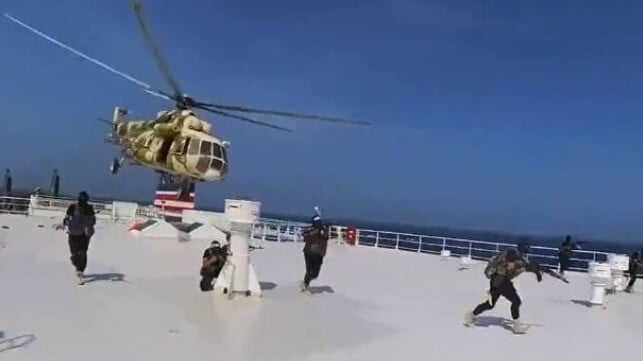Yemen's Houthi Rebels Signal Plan to Release Seized Car Carrier

After announcing a long-awaited halt to attacks on merchant shipping in the Red Sea, Yemen's Houthi militant group said Tuesday that it is preparing to release the car carrier Galaxy Leader, which it captured in late 2023.
The group's commando forces boarded the PCTC by helicopter and seized control of the bridge on November 19, 2023, taking the crew and the vessel hostage. It was the group's first high-profile attack on shipping after the start of the war in Gaza, and it presaged countless Houthi attacks to follow. The Houthis cited the Israeli-linked ownership interests of the ship's commercial operator, UK-based Ray Car Carriers, in justifying the seizure.
The militants diverted the vessel to an anchorage near Hodeidah, Yemen and opened it to the public, making it a popular tourist attraction for Yemenis. At one point shortly after the ship's capture, there were enough sightseers on the top deck that the crowd was visible in satellite surveillance imaging.
For the crew, the ordeal was far less joyous. They have been held in a foreign land for more than a year, despite constant appeals from the IMO and the International Chamber of Shipping for their release. ICS noted that many of the crew had already been aboard the ship for long hitches before they were captured, and some were nearing the two-year mark since they left their homes, with few opportunities to contact family and friends. ICS Secretary General Guy Platten called their continued detention "unconscionable."
The government of the Philippines also attempted to intercede to secure the freedom of 17 Filipino seafarers on board, but without success. The remainder of the crew includes three Ukrainians, two Bulgarians, two Mexicans and one Romanian, reflecting the global nature of shipping and crewing.
The attack on Galaxy Leader was only the beginning of a year-long Houthi blockade of the Red Sea. Over the course of the campaign, Houthi fighters attacked more than 100 vessels with missiles, drones and bomb boats, sinking two ships and killing four seafarers.
Up until last weekend, Houthi forces continued to claim new attacks on U.S. Navy warships, including the carrier USS Harry S. Truman. These attacks were often intense: In a recent example, Naval Surface Forces commander Vice Adm. Brendan McLane reported that the crew of USS Spruance had to shoot down three incoming ballistic missiles, three cruise missiles and seven suicide drones in a single engagement.
No strikes on U.S. warships have been reported. However, the campaign to intercept and prevent Houthi attacks has cost the U.S. Navy several billion dollars and more than 200 missiles, including 80 SM-6 dual-role antiaircraft/antiship missiles valued at $4 million each - depleting an expensive and hard-to-replace inventory.
